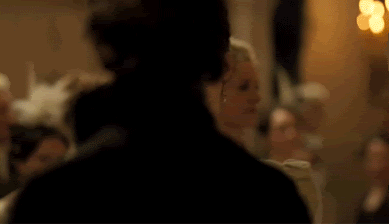Post by shmeep on Oct 28, 2005 17:08:56 GMT -5
Marlon's Brando
by maggiethecat
Pity the poor Dunbars. After they came together so touchingly at the end of “Up on the Roof,” we open with them in bed, heading into that most blissful of morning wake-up calls. Hank’s banished, Jim’s almost got her shirt off . . . . . . and his beeper goes. Of course.
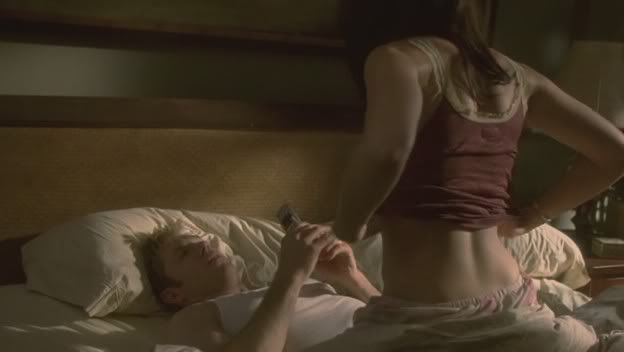
“Can we pick this up later?” he asks hopefully, after taking the call. “I’m out tonight,” Christie replies, her mood flattened. “It’s Fashion Week.”
It’s like the never-emptying soup pot in the fairy tale. The minute Jim Dunbar comes to terms with one emotional pitfall on his journey of redemption and healing, another comes along to take its place. This time it’s the twin issues of "protect and serve," the stated mission of all cops and what defines their lives. Can he still be a cop, can he still be a man. Can he, as he claimed so defiantly, "Make this work."
From the beginning of “Marlon’s Brando” Jim is so tense you could bounce quarters off him, starting with his reactions at the crime scene. They can all see that something is eating away at him, but only Karen is open enough to call him on it. Can he protect Christie? Can he protect Karen? By the end of the episode we know the answer is . . . not really. If the suspect who killed himself in front of Karen and Jim had turned his gun on her instead, “there wouldn’t have been a damned thing I could have done about it” he tells Galloway. He will finally open up to the good doctor, forced by circumstance to admit, as Galloway says, that maybe, just maybe, he’s no “super cop.” “That's what I have to be, isn't it?” he says wistfully. “To pass the test?”
The team has been handed a difficult case, and a grimy one. Two women have been slashed and raped, one the sister and one the ex-wife of Leonard Mattus, a thoroughly creepy piece of work, an Aryan Nation lifer at Sing Sing who runs his tier like a dictator. (Scarier than the Chief of Ds, that guy.) And the crime scene is putting images in Jim’s head, disturbing nightmarish flashes of Christie, bloodied and crying out to him.
He’s tense, he’s angry, and Russo ain’t helping. In fact, Marty seems to have hit a new level of acrimony, laying much of the groundwork for the final confrontation in “Seoul Man.” No easy banter about bowling and pool here: he’s just plain fed up with Dunbar.
The victims’ faces have been slashed with a jagged Z, and the only way for Karen to show Jim is to trace the line on his face with her finger. “You weren’t going to draw me a picture, were you?” he asks dryly. “No. Of course not,” she answers, hastily capping the ballpoint and putting down the pad. A genuinely funny moment, and there are precious few in “Marlon’s Brando.” So she does the finger trick . . .
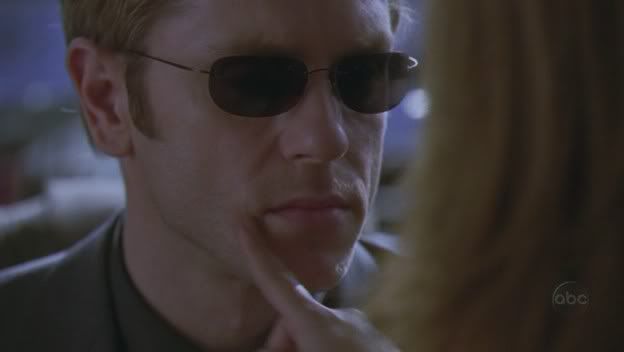
. . . and Marty and Tom see it. “Aw, that’s cute,” Marty says acidly. “A real Helen Keller moment.” I love sick humor as much as the next person (“Blackadder,” anyone?) but this hit me as cruel. But does it matter whether or not *we* think Marty’s remarks are amusing? The writers, I think, intended to shock, as witness the reactions of the other characters. Karen’s immediate “Up yours, Marty.” Tom, again, shoots him the “What's wrong with you, man?” look.
How many examples do we have of Marty’s hoof-in-mouth disease, always followed by that incredulous expression on Tom’s face? (The pattern was set in The Pilot, Marty’s “balls of steel at the bank” comment followed by Tom’s quick “Not to bring up the past.”) This time, it’s all about Marty needling Jim, trying to get the upper hand any way he can. How else can he do it? He doesn’t have seniority, he’s not a better detective when it comes to analyzing clues, he’s not a more skilled interrogator. So he uses Jim’s blindness as a weapon.
What also hits me, on reflection, is how central Jim’s blindness is to “Marlon’s Brando.” I know, it’s central to every episode (!), but this is the only time we see him “use” it. Nancy Dressler, her face now disfigured, is uncomfortable talking to a pretty young women like Karen, and so Karen asks Jim to interview her. “You want me to play up the blindness?” he asks. His face stiffens, but he agrees. Catch the tiny, almost imperceptible flicker of compassion on Karen’s face when Jim shakes out his cane and fumbles for the latch of Nancy’s hospital room: it’s almost as though she sometimes has to stop and remind herself, “Oh, right. Blind.” He plays it to the hilt, fumbling with his cane for effect, asking Nancy if he’s facing her when he knows he is . . . it’s all as smooth as silk until he starts to “see” Christie in the bed, wounded and vulnerable. He’s really hitting a bad patch. He was much cooler, much more in command, in “Up on the Roof,” in which he finally dealt with Terry Jansen’s cowardice. But in “Marlon’s Brando” the strain of simply making it though each day is starting to wear on him.
And his anger, which he once told Galloway he was afraid would boil up uncontrollably, does just that. The case leads them to the apartment of one Marlon Condell, who was spotted at Nancy’s apartment house and who served time with Mattus. When Karen and Jim get there they hear a fight inside – and, before Karen can act or speak, Jim bursts through the door. It’s the old Dunbar, the old “first through the door” super cop, the old instincts he can’t seem to shake. The man beating Condell attacks him and there’s a brief struggle to get him down and cuffed. Jim pulls out his cane to navigate the room while Karen attends to Condell. “You’re blind?” the perp laughs. “Oh my God.” And Jim loses it. Lightening fast, he refolds the cane into a club and smashes it against the man’s legs.
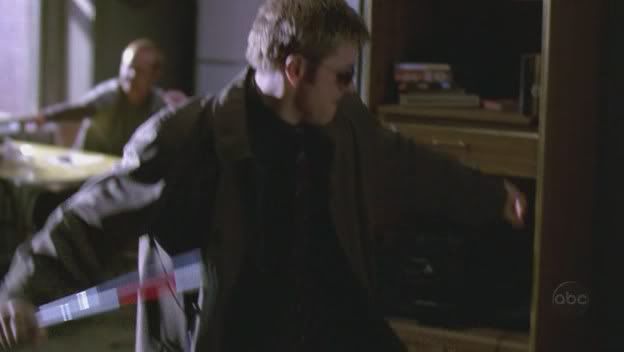
It’s a quick fierce little scene, and neatly underscores Jim’s mounting frustration. And it's intriguing, I think, that in this one episode the blind man's white cane, that traditional and most visible symbol of sightlessness, is used as a deliberate object of pity -- and as a weapon.
Eventually Karen and Jim return to Marlon’s apartment, hoping he’ll be more forthcoming there than at the squad room. A pitiful, troubled little man, he had raped and slashed the two women as retribution for Leonard Mattus’s having done the same to him. The slashed Zs, together, formed a swastika, a message to Mattus. “I was just a kid,” Marlon howls, pulling up his shirt to reveal the swastika Mattus carved on his chest. And then he goes for his gun, puts it under his chin, and, despite Karen’s impassioned pleading and Jim’s disoriented panic to protect her, pulls the trigger.
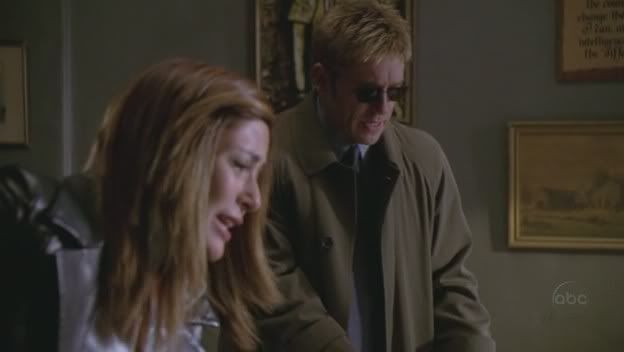
“Listen, Jimmy,” Karen tells him later, “this case? There’s some things you should be glad you couldn’t see. No offense.” “None taken,” he replies, his face white with strain. And Marty, never one to let anything go, tells him that while he respects his worth in closing cases, if anything had happened to Karen, “I’d make it my life’s work to see you off the job.” It’s been the day from Hell, and by the time Jim gets to Galloway’s office he’s too raw, too exhausted, too stripped of pretense to play the “I’m fine” game.
It is perhaps my favorite scene between Dunbar and Galloway, and every time I watch it I again regret their sessions ending halfway through the series. This one case has brought home, in stark and uncompromising terms, what Jim can no longer do as a cop: he can’t be the first through the door and he can’t cover his partner’s back if someone pulls a gun. “Jim, you questioning your ability to do the job?” Galloway asks quietly.
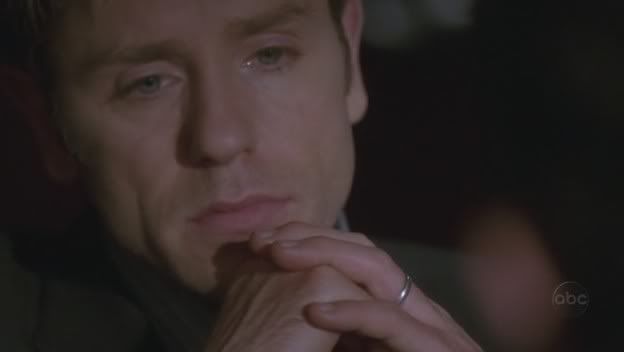
His hands to his face, anguish and loss mingled in a sensitively shot close-up, he replies, “Yeah . . . maybe I am.” And then, because this is Jim Dunbar, the quick humor, his hands out and ready for the cuffs. “What’s that?” he says, startling Galloway. “Internal affairs comin’ through the door? You got me.” Not one to wallow, our Jim, not for long. But he has been forced to a bitter honesty, a moment of self-knowledge both painful and freeing. And, says Galloway, “It’s a start.”
Then the final scene, the walk along the Esplanade with Christie, Jim openly and honestly confessing his doubts, his confusion, and the stone cold fact that “This isn't easy.” Not if they do it together, she reassures him, not if he understands that she has never felt unsafe with him, sighted or blind. And then the line that seemed a little saccharine the first time around, but now I think she said it just to make him laugh: “Besides, you’re my man, and you’ve still got the gun.” He does laugh, and they kiss, and you know his long terrible day just got a whole lot better.
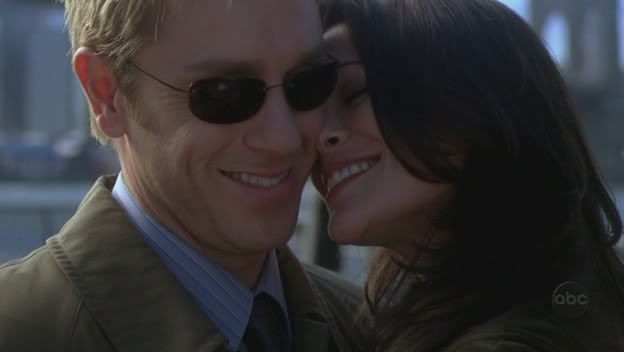
Despite the peaceful and hopeful conclusion, “Marlon’s Brando” is a very dark episode, gritty and unsettling. But so emotionally rich. So much to savor, and remember.
So damned well done, in so many ways.
by maggiethecat
Pity the poor Dunbars. After they came together so touchingly at the end of “Up on the Roof,” we open with them in bed, heading into that most blissful of morning wake-up calls. Hank’s banished, Jim’s almost got her shirt off . . . . . . and his beeper goes. Of course.

“Can we pick this up later?” he asks hopefully, after taking the call. “I’m out tonight,” Christie replies, her mood flattened. “It’s Fashion Week.”
It’s like the never-emptying soup pot in the fairy tale. The minute Jim Dunbar comes to terms with one emotional pitfall on his journey of redemption and healing, another comes along to take its place. This time it’s the twin issues of "protect and serve," the stated mission of all cops and what defines their lives. Can he still be a cop, can he still be a man. Can he, as he claimed so defiantly, "Make this work."
From the beginning of “Marlon’s Brando” Jim is so tense you could bounce quarters off him, starting with his reactions at the crime scene. They can all see that something is eating away at him, but only Karen is open enough to call him on it. Can he protect Christie? Can he protect Karen? By the end of the episode we know the answer is . . . not really. If the suspect who killed himself in front of Karen and Jim had turned his gun on her instead, “there wouldn’t have been a damned thing I could have done about it” he tells Galloway. He will finally open up to the good doctor, forced by circumstance to admit, as Galloway says, that maybe, just maybe, he’s no “super cop.” “That's what I have to be, isn't it?” he says wistfully. “To pass the test?”
The team has been handed a difficult case, and a grimy one. Two women have been slashed and raped, one the sister and one the ex-wife of Leonard Mattus, a thoroughly creepy piece of work, an Aryan Nation lifer at Sing Sing who runs his tier like a dictator. (Scarier than the Chief of Ds, that guy.) And the crime scene is putting images in Jim’s head, disturbing nightmarish flashes of Christie, bloodied and crying out to him.
He’s tense, he’s angry, and Russo ain’t helping. In fact, Marty seems to have hit a new level of acrimony, laying much of the groundwork for the final confrontation in “Seoul Man.” No easy banter about bowling and pool here: he’s just plain fed up with Dunbar.
The victims’ faces have been slashed with a jagged Z, and the only way for Karen to show Jim is to trace the line on his face with her finger. “You weren’t going to draw me a picture, were you?” he asks dryly. “No. Of course not,” she answers, hastily capping the ballpoint and putting down the pad. A genuinely funny moment, and there are precious few in “Marlon’s Brando.” So she does the finger trick . . .

. . . and Marty and Tom see it. “Aw, that’s cute,” Marty says acidly. “A real Helen Keller moment.” I love sick humor as much as the next person (“Blackadder,” anyone?) but this hit me as cruel. But does it matter whether or not *we* think Marty’s remarks are amusing? The writers, I think, intended to shock, as witness the reactions of the other characters. Karen’s immediate “Up yours, Marty.” Tom, again, shoots him the “What's wrong with you, man?” look.
How many examples do we have of Marty’s hoof-in-mouth disease, always followed by that incredulous expression on Tom’s face? (The pattern was set in The Pilot, Marty’s “balls of steel at the bank” comment followed by Tom’s quick “Not to bring up the past.”) This time, it’s all about Marty needling Jim, trying to get the upper hand any way he can. How else can he do it? He doesn’t have seniority, he’s not a better detective when it comes to analyzing clues, he’s not a more skilled interrogator. So he uses Jim’s blindness as a weapon.
What also hits me, on reflection, is how central Jim’s blindness is to “Marlon’s Brando.” I know, it’s central to every episode (!), but this is the only time we see him “use” it. Nancy Dressler, her face now disfigured, is uncomfortable talking to a pretty young women like Karen, and so Karen asks Jim to interview her. “You want me to play up the blindness?” he asks. His face stiffens, but he agrees. Catch the tiny, almost imperceptible flicker of compassion on Karen’s face when Jim shakes out his cane and fumbles for the latch of Nancy’s hospital room: it’s almost as though she sometimes has to stop and remind herself, “Oh, right. Blind.” He plays it to the hilt, fumbling with his cane for effect, asking Nancy if he’s facing her when he knows he is . . . it’s all as smooth as silk until he starts to “see” Christie in the bed, wounded and vulnerable. He’s really hitting a bad patch. He was much cooler, much more in command, in “Up on the Roof,” in which he finally dealt with Terry Jansen’s cowardice. But in “Marlon’s Brando” the strain of simply making it though each day is starting to wear on him.
And his anger, which he once told Galloway he was afraid would boil up uncontrollably, does just that. The case leads them to the apartment of one Marlon Condell, who was spotted at Nancy’s apartment house and who served time with Mattus. When Karen and Jim get there they hear a fight inside – and, before Karen can act or speak, Jim bursts through the door. It’s the old Dunbar, the old “first through the door” super cop, the old instincts he can’t seem to shake. The man beating Condell attacks him and there’s a brief struggle to get him down and cuffed. Jim pulls out his cane to navigate the room while Karen attends to Condell. “You’re blind?” the perp laughs. “Oh my God.” And Jim loses it. Lightening fast, he refolds the cane into a club and smashes it against the man’s legs.

It’s a quick fierce little scene, and neatly underscores Jim’s mounting frustration. And it's intriguing, I think, that in this one episode the blind man's white cane, that traditional and most visible symbol of sightlessness, is used as a deliberate object of pity -- and as a weapon.
Eventually Karen and Jim return to Marlon’s apartment, hoping he’ll be more forthcoming there than at the squad room. A pitiful, troubled little man, he had raped and slashed the two women as retribution for Leonard Mattus’s having done the same to him. The slashed Zs, together, formed a swastika, a message to Mattus. “I was just a kid,” Marlon howls, pulling up his shirt to reveal the swastika Mattus carved on his chest. And then he goes for his gun, puts it under his chin, and, despite Karen’s impassioned pleading and Jim’s disoriented panic to protect her, pulls the trigger.

“Listen, Jimmy,” Karen tells him later, “this case? There’s some things you should be glad you couldn’t see. No offense.” “None taken,” he replies, his face white with strain. And Marty, never one to let anything go, tells him that while he respects his worth in closing cases, if anything had happened to Karen, “I’d make it my life’s work to see you off the job.” It’s been the day from Hell, and by the time Jim gets to Galloway’s office he’s too raw, too exhausted, too stripped of pretense to play the “I’m fine” game.
It is perhaps my favorite scene between Dunbar and Galloway, and every time I watch it I again regret their sessions ending halfway through the series. This one case has brought home, in stark and uncompromising terms, what Jim can no longer do as a cop: he can’t be the first through the door and he can’t cover his partner’s back if someone pulls a gun. “Jim, you questioning your ability to do the job?” Galloway asks quietly.

His hands to his face, anguish and loss mingled in a sensitively shot close-up, he replies, “Yeah . . . maybe I am.” And then, because this is Jim Dunbar, the quick humor, his hands out and ready for the cuffs. “What’s that?” he says, startling Galloway. “Internal affairs comin’ through the door? You got me.” Not one to wallow, our Jim, not for long. But he has been forced to a bitter honesty, a moment of self-knowledge both painful and freeing. And, says Galloway, “It’s a start.”
Then the final scene, the walk along the Esplanade with Christie, Jim openly and honestly confessing his doubts, his confusion, and the stone cold fact that “This isn't easy.” Not if they do it together, she reassures him, not if he understands that she has never felt unsafe with him, sighted or blind. And then the line that seemed a little saccharine the first time around, but now I think she said it just to make him laugh: “Besides, you’re my man, and you’ve still got the gun.” He does laugh, and they kiss, and you know his long terrible day just got a whole lot better.

Despite the peaceful and hopeful conclusion, “Marlon’s Brando” is a very dark episode, gritty and unsettling. But so emotionally rich. So much to savor, and remember.
So damned well done, in so many ways.

